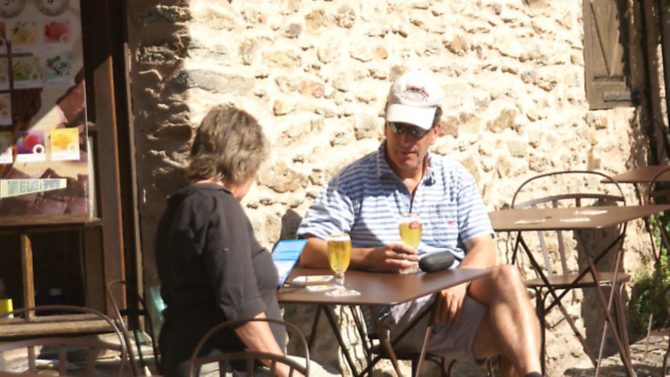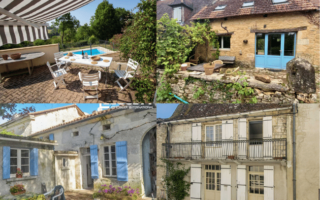Your twilight saga: planning finances for your retirement in France

Cruise smoothly into the perfect retirement in France by planning all your finances, healthcare insurances and inheritance affairs now, says tax expert Joanna Reintjes
So why leave the UK for France on a permanent basis? Perhaps you dream of running a little café with an outdoor terrace in a picture-postcard French village, or maybe just putting your feet up on a sun lounger shaded by olive trees, with your Kindle in one hand and a glass of wine in the other.
Whatever your reasons for wanting to retire to France, there has never been a better time to buy, with the pound/euro exchange rate predicted to hit 1.30, and with low prices in most non-urban settings. Once you have made up your mind, there are lots of practical matters to think about, especially if you are thinking of spending your retirement in your new home.
Practical appeal
If you chose a rural idyll over urban chic, remember not to be too ambitious with the plot of land; choosing a property with five acres might be great now for your taste of the French good life but it could become a burden later on as you get older, and do you really want to be that cut off? A village with a bar and bakery might be just as quaint, and many edge of town properties have large gardens nudging an acre. The practicalities of having a doctor, bank and other facilities, plus places to eat out, will mean you won’t have to travel far to organise the practicalities of daily life. Having a coffee at your local bar is also a good place to show your face, and get to know the locals.
Manage your money
Planning your finances shouldn’t just be about the budget for the property purchase. Get forecasts for your pension funds, and work out a budget for food and fixed costs based on how much you are spending now. Make sure you are realistic, and allow for added costs such as your travel to and from the UK to visit family and friends.
Check that your life insurance policies will still be valid and consider taking lump sums from pensions before you leave the UK. These sums will be taxable in France, if you are French tax-resident when you receive the pension lump sum.
New budget proposals to reduce the time you have to sell your main residence in the UK tax-free might mean it is more sensible to sell the family home and buy two smaller properties if you plan to generate rental income, and keep a bolthole for an eventual return to the UK. Watch out for the statutory residency test, which might keep you tax-resident in the UK. If you plan to make France your home then you will establish French tax residency from your arrival date. This means that you will have to declare your worldwide income in France (watch out for wealth tax if you have substantial capital).
This might actually save you some money, as under the new 2015 budget proposals there is a reduction of income tax planned for those with modest levels of income. Many UK pensions can be paid gross to you, once you have proof of French residency by submitting your first French income tax return.
Healthcare arrangements
Under reciprocal arrangements, the S1 is available to all those of state retirement age (each application will be assessed on your National Insurance record, and age criteria), and for many of those drawing a government service pension.
If you are below state retirement age, and plan running a lifestyle business, you could well be entitled to cover so long as your business is considered as ‘professional’. Setting up as an auto-entrepreneur (simplified business registration in France) could be a solution, as it is easy to work out your business social charges, and you only pay cotisations once your business is underway and you are earning money. The typical rate of social charges is 13% for sales of goods and 24.5% for services.
If you have an existing business in the UK, you might also be able to migrate and work in France with a self-employed exemption certificate. You still need to register your business in France and apply for health cover, but this might be another solution to tide you over until state retirement age, working reduced hours perhaps.
Private policies are also available and these give the added benefit of no CSG on your investment income (CSG is a French national insurance charge, currently at 15.5%, which does not confer healthcare rights).
Aside from healthcare, France is a great country from the point of view of home help, and you can have taxis reimbursed to get you to and from essential medical visits. The ADMR administers and organises such services, and there are even tax credits when you employ home help staff directly.
On a social note, there are also lots of clubs in France, from cycling to hiking to jewellery making. It’s not always obvious what is available in your area, but the mairie is a good place to find out, as are the associations in your local area.
Shopping services and home help tasks come under the heading of services à la personne and many people advertise these services in the local bar or boulangerie.
Taxing affairs
No one likes to think about tax when planning their retirement, but it’s important to understand your tax exposure, so that you can work out what your disposable income will be. People often put off any inheritance tax planning, but do make this a priority, as it will give you great peace of mind.
One important aspect of French law is that children have protected rights, so you would need to make sure that the surviving spouse is protected – from an income point of view, and also to have protection to stay in the family home. There are options available to gift a life interest to your spouse (donation entre époux), so they can stay living in the family home. Other options can be put in place when you buy the property, such as a clause tontine or French marriage contract. Inheritance taxes will be on your estate while you are domiciled in France, and these might prompt you to put extra life cover in place, to provide a lump sum to pay any taxes due.
The key to a successful retirement to France is in the planning, and making sure your finances are sorted out before you make the move. You might be pleasantly surprised to find your income tax bill actually goes down. Bon courage.
Joanna Reintjes is an ‘expert comptable’ with AFA Expertise
Tel: 0033 (0)2 99 48 72 88
Share to: Facebook Twitter LinkedIn Email


